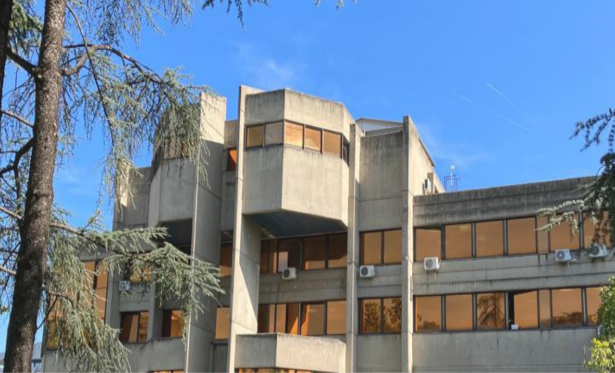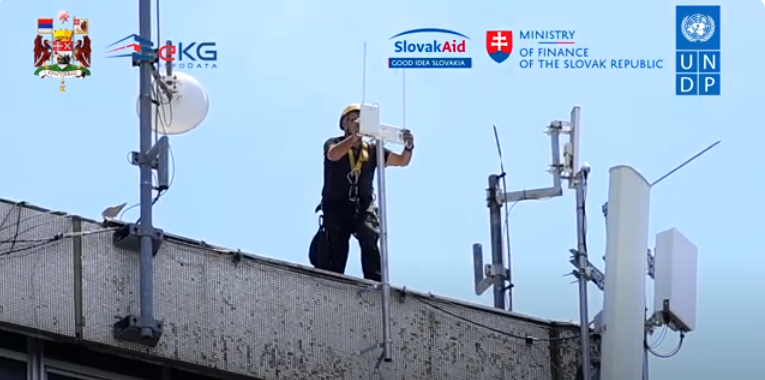RESOURCE MOBILIZATION FACILITY
Energy Efficiency Improvement Of Government Building

Official project title: Energy Efficiency Renovation of Central Government Building – Feasibility Study on EE Renovation of SIV 3 building
The SIV 3 administrative building houses a number of government ministries and central offices in Serbia. Its reconstruction is part of a plan to renovate a total of 28 government buildings in Serbia.
As part of the project, geothermal boreholes have been drilled and their energy output measured. Their use in the renovation is analysed in a feasibility study that was developed within the project. The study confirmed the sufficient capacity of geothermal energy for cooling and heating the building. The renovation should reduce operational energy requirements with the use of modern technologies. It is expected to help reduce energy requirements by more than 40% and CO2 emissions by more than 45%.
The project helped co-finance the development of project documentation for the reconstruction of the SIV 3 building. Reconstruction itself is expected to be funded by a loan from the Council of Europe Development Bank (CEB) which has already been agreed for Serbia. The start of the reconstruction is planned for 2025.
Public Lorawan Network In Kragujevac

Official project title: Public LoRaWAN network in Kragujevac
The project developed documentation for building local Internet LoRaWan network in the city of Kragujevac in Serbia. LoRaWan is a special mobile network designed primarily for communication with devices pursuing the IoT (Internet of Things) standards.
The LoRaWan network has been successfully installed and put into operation. It includes 12 access points, covering most of the city. The local university became the technological research partner of the project, so 2 access points cover the university site and students can be involved in the development of new Smart City solutions.
More than 25 smart sensors and control elements are currently connected to the network. They monitor the state of waste in collection containers, the level of the Lepenica river and its tributaries. Additional sensors monitor and help control public lighting. The entire network is connected to the city’s data center and is managed by the city’s IT company. The ambition of the city of Kragujevac is to become a center for the exchange of experience and the deployment of Smart City solutions within Serbia.
Biomass To Biogas
Official project title: Use of biomass for cogeneration in wastewater treatment
The project focused on the use of waste generated in the wastewater treatment plant under construction of the city of Čačak. A list of economic and agricultural entities from which the city can obtain raw materials for the co-generation plant was prepared.
A study that was developed showed the current shortage and inappropriate structure of bio-waste for the construction of a biogas station. Based on these findings, the city is negotiating the construction of a composting plant that will allow it to process the current 7,000 tons of produced and collected bio-waste. This will significantly reduce the costs of its landfilling and transportation. After the construction of the wastewater treatment plant is completed, it is assumed that the amount of biowaste will be sufficient for the construction of the biogas station.
Model For The Construction Of A Biogas Plant
Official project title: Potential of biogas production from biowaste in urban and peri-urban regions
The project aimed to help municipalities looking into the possibilities of collecting and using biodegradable waste. For the municipalities of Kikinda, Subotica, and Sremska Mitrovica, a study was developed that demonstrates the potential for the use of biowaste for the construction of biogas stations. It defines appropriate biowaste (raw materials) and its necessary quantities that can be used in biogas facility and specifies most appropriate financial support mechanism/model for investment in biogas production from biowaste.
Based on the results of the study, the municipalities can start preparing projects and finding financial resources for their construction. The study can serve as a general guide for other municipalities in the region.
Energy Efficiency Of Ministry Of Education of Serbia Infrastructure
Official project title: Zero Energy Renovation Study
To assist the Ministry of Education of Serbia define priorities, resources, organization structure, information system and control the mechanisms for investing in education facilities, a feasibility study was developed. It describes the current status of 51 school buildings and 3 investment strategies for their energy efficient renovation. The study divided the reconstruction work into 4 investment packages with a total value of 50 million USD. Their implementation will be realized depending on the sources available. The study can be universally applied to other buildings built according to similar projects.

